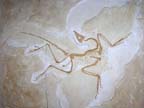 |
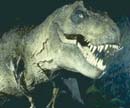 |
 |
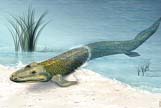 |
 |
Produced
by the Population Genetics and Evolution class, Furman University |
||||
 |
 |
 |
 |
 |
Produced
by the Population Genetics and Evolution class, Furman University |
||||
 |
The
Carboniferous: Temnospondyls |
 |
||
| Temnospondyli,
an order of very widespread and large extinct 'proto-amphibians', have
been found all over the world in different environments. Resembling large
salamanders or small crocodiles, temnospondyls ranged between 20 cm to
3 m long, with varying lengths of snouts. Temnospondyls also did not have
a specific ecological niche, they ranged from aquatic (freshwater) to
terrestrial habitats (Stever and Laurin 2009). Although all temnospondyls
laid their eggs in water, some adults used their limbs to swim in the
water or walk on land, while others also used their powerful tail and
hind legs to propel themselves on land or water with eel-like motions
(White and Kazlev 2009). One defining characteristic of the temnospondyls
are their large, flat heads with bicuspid pedicellate teeth that were
most likely used to eat small fish. It has been suggested that modern
amphibians originated from within the temnospondyli order (Steyer and
Laurin 2009). Cochleosaurids, a family of temnospondyls, were long-snouted
edopoids that ranged from 30 cm to 3 meters long. They did not have lateral
lines on their bodies, so they were thought to be mainly terrestrial (White
and Kazlev 2009). A genus called Branchiosaurus, a member of
the temnospondyli order, is an example of the aquatic temnospondyls, as
they were known to have 3 pairs of external gills and lived during the
late Carboniferous period (Branchiosauridae 2006) Page by Julia Bobo |
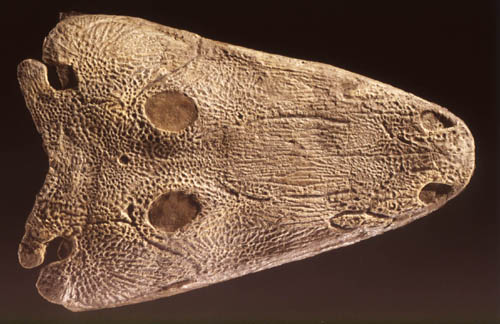 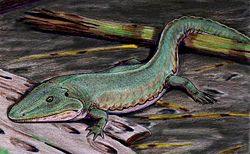 |
| Top Picture: Skull of a Parotosaurus
of the Temnospondyli order. Photo from: The Tree of Life Bottom Picture: Artist’s interpretation of a Cochleosaurus. Photo from: Wikipedia Commons |
|
| Steyer JS and Laurin M. 2009. Temnospondyli. Tree of Life website. Accessed March 3, 2010. White T and Kazlev MA. 2009. Temnospondyli. Palaeos.com. Accessed March 3, 2010.Branchiosauridae. 2006. Permian tetrapods website. Accessed March 3, 2010. Wikipedia. 2009.Branchiosaurus. Accessed March 3, 2010. |